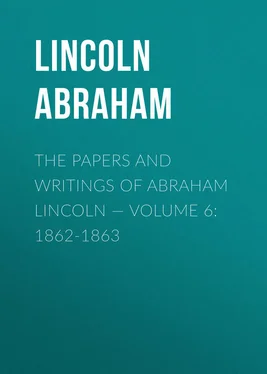Abraham Lincoln - The Papers And Writings Of Abraham Lincoln — Volume 6 - 1862-1863
Здесь есть возможность читать онлайн «Abraham Lincoln - The Papers And Writings Of Abraham Lincoln — Volume 6 - 1862-1863» — ознакомительный отрывок электронной книги совершенно бесплатно, а после прочтения отрывка купить полную версию. В некоторых случаях можно слушать аудио, скачать через торрент в формате fb2 и присутствует краткое содержание. Жанр: foreign_antique, foreign_prose, на английском языке. Описание произведения, (предисловие) а так же отзывы посетителей доступны на портале библиотеки ЛибКат.
- Название:The Papers And Writings Of Abraham Lincoln — Volume 6: 1862-1863
- Автор:
- Жанр:
- Год:неизвестен
- ISBN:нет данных
- Рейтинг книги:3 / 5. Голосов: 1
-
Избранное:Добавить в избранное
- Отзывы:
-
Ваша оценка:
- 60
- 1
- 2
- 3
- 4
- 5
The Papers And Writings Of Abraham Lincoln — Volume 6: 1862-1863: краткое содержание, описание и аннотация
Предлагаем к чтению аннотацию, описание, краткое содержание или предисловие (зависит от того, что написал сам автор книги «The Papers And Writings Of Abraham Lincoln — Volume 6: 1862-1863»). Если вы не нашли необходимую информацию о книге — напишите в комментариях, мы постараемся отыскать её.
The Papers And Writings Of Abraham Lincoln — Volume 6: 1862-1863 — читать онлайн ознакомительный отрывок
Ниже представлен текст книги, разбитый по страницам. Система сохранения места последней прочитанной страницы, позволяет с удобством читать онлайн бесплатно книгу «The Papers And Writings Of Abraham Lincoln — Volume 6: 1862-1863», без необходимости каждый раз заново искать на чём Вы остановились. Поставьте закладку, и сможете в любой момент перейти на страницу, на которой закончили чтение.
Интервал:
Закладка:
Abraham Lincoln
The Papers And Writings Of Abraham Lincoln — Volume 6: 1862-1863
RECOMMENDATION OF NAVAL OFFICERS
WASHINGTON, D.C., May 14, 1862.
TO SENATE AND HOUSE OF REPRESENTATIVES:
The third section of the "Act further to promote the efficiency of the Navy," approved 21st of December, 1861, provides:
"That the President of the United States by and with the advice and consent of the Senate, shall have the authority to detail from the retired list of the navy for the command of squadrons and single ships such officers as he may believe that the good of the service requires to be thus placed in command; and such officers may, if upon the recommendation of the President of the United States they shall receive a vote of thanks of Congress for their services and gallantry in action against an enemy, be restored to the active list, and not otherwise."
In conformity with this law, Captain David G. Farragut was nominated to the Senate for continuance as the flag-officer in command of the squadron which recently rendered such important service to the Union by his successful operations on the lower Mississippi and capture of New Orleans.
Believing that no occasion could arise which would more fully correspond with the intention of the law or be more pregnant with happy influence as an example, I cordially recommend that Captain D. G. Farragut receive a vote of thanks of Congress for his services and gallantry displayed in the capture since 21st December, 1861, of Forts Jackson and St. Philip, city of New Orleans, and the destruction of various rebel gunboats, rams, etc...
TO THE SENATE AND HOUSE OF REPRESENTATIVES:
I submit herewith a list of naval officers who commanded vessels engaged in the recent brilliant operations of the squadron commanded by Flag-officer Farragut which led to the capture of Forts Jackson and St. Philip, city of New Orleans, and the destruction of rebel gunboats, rams, etc., in April 1862. For their services and gallantry on those occasions I cordially recommend that they should, by name, receive a vote of thanks of Congress:
LIST:
Captain Theodorus Bailey.
Captain Henry W. Morris.
Captain Thomas T. Craven.
Commander Henry H. Bell.
Commander Samuel Phillips Lee.
Commander Samuel Swartwout.
Commander Melancton Smith.
Commander Charles Stewart Boggs
Commander John De Camp
Commander James Alden.
Commander David D. Porter.
Commander Richard Wainwright.
Commander William B. Renshaw.
Lieutenant Commanding Abram D. Harrell.
Lieutenant Commanding Edward Donaldson.
Lieutenant Commanding George H. Preble.
Lieutenant Commanding Edward T. Nichols.
Lieutenant Commanding Jonathan M. Wainwright.
Lieutenant Commanding John Guest.
Lieutenant Commanding Charles H. B. Caldwell.
Lieutenant Commanding Napoleon B. Harrison.
Lieutenant Commanding Albert N. Smith.
Lieutenant Commanding Pierce Crosby.
Lieutenant Commanding George M. Ransom.
Lieutenant Commanding Watson Smith.
Lieutenant Commanding John H. Russell.
Lieutenant Commanding Walter W. Queen.
Lieutenant Commanding K. Randolph Breese.
Acting Lieutenant Commanding Sellin E. Woolworth.
Acting Lieutenant Commanding Charles H. Baldwin.
A. LINCOLN.
WASHINGTON, D.C., May 14, 1862
TELEGRAM TO GENERAL G. B. McCLELLAN
MAJOR-GENERAL McCLELLAN, Cumberland, Virginia:
Your long despatch of yesterday is just received. I will answer more fully soon. Will say now that all your despatches to the Secretary of War have been promptly shown to me. Have done and shall do all I could and can to sustain you. Hoped that the opening of James River and putting Wool and Burnside in communication, with an open road to Richmond, or to you, had effected something in that direction. I am still unwilling to take all our force off the direct line between Richmond and here.
A. LINCOLN.
SPEECH TO THE 12TH INDIANA REGIMENT, MAY [15?] 1862
It has not been customary heretofore, nor will it be hereafter, for me to say something to every regiment passing in review. It occurs too frequently for me to have speeches ready on all occasions. As you have paid such a mark of respect to the chief magistrate, it appears that I should say a word or two in reply. Your colonel has thought fit, on his own account and in your name, to say that you are satisfied with the manner in which I have performed my part in the difficulties which have surrounded the nation. For your kind expressions I am extremely grateful, but on the other hand I assure you that the nation is more indebted to you, and such as you, than to me. It is upon the brave hearts and strong arms of the people of the country that our reliance has been placed in support of free government and free institutions.
For the part which you and the brave army of which you are a part have, under Providence, performed in this great struggle, I tender more thanks especially to this regiment, which has been the subject of good report. The thanks of the nation will follow you, and may God's blessing rest upon you now and forever. I hope that upon your return to your homes you will find your friends and loved ones well and happy. I bid you farewell.
TELEGRAM TO GENERAL I. McDOWELL
MAJOR-GENERAL McDOWELL:
What is the strength of your force now actually with you?
A. LINCOLN.
MEMORANDUM OF PROPOSED ADDITIONS TO INSTRUCTIONS OF ABOVE DATE
May 17, 1862. You will retain the separate command of the forces taken with you; but while co-operating with General McClellan you will obey his orders, except that you are to judge, and are not to allow your force to be disposed otherwise than so as to give the greatest protection to this capital which may be possible from that distance.
[Indorsement.]
TO THE SECRETARY OF WAR:
The President having shown this to me, I suggested that it is dangerous to direct a subordinate not to obey the orders of his superior in any case, and that to give instructions to General McClellan to this same end and furnish General McDowell with a copy thereof would effect the object desired by the President. He desired me to say that the sketch of instructions to General McClellan herewith he thought made this addition unnecessary.
Respectfully, M. C. M.
MILITARY EMANCIPATION
INDORSEMENT RELATING TO GENERAL DAVID HUNTER'S ORDER OF MILITARY EMANCIPATION,
MAY 17, 1862
No commanding general shall do such a thing upon my responsibility without consulting me.
A. LINCOLN.
FROM SECRETARY STANTON TO GENERAL McCLELLAN
GENERAL: Your despatch to the President, asking reinforcements, has been received and carefully considered.
The President is not willing to uncover the capital entirely; and it is believed that, even if this were prudent, it would require more time to effect a junction between your army and that of the Rappahannock by the way of the Potomac and York rivers than by a land march. In order, therefore, to increase the strength of the attack upon Richmond at the earliest moment, General McDowell has been ordered to march upon that city by the shortest route. He is ordered, keeping himself always in position to save the capital from all possible attack, so to operate as to put his left wing in communication with your right wing, and you are instructed to co-operate so as to establish this communication as soon as possible by extending your right-wing to the north of Richmond.
Читать дальшеИнтервал:
Закладка:
Похожие книги на «The Papers And Writings Of Abraham Lincoln — Volume 6: 1862-1863»
Представляем Вашему вниманию похожие книги на «The Papers And Writings Of Abraham Lincoln — Volume 6: 1862-1863» списком для выбора. Мы отобрали схожую по названию и смыслу литературу в надежде предоставить читателям больше вариантов отыскать новые, интересные, ещё непрочитанные произведения.
Обсуждение, отзывы о книге «The Papers And Writings Of Abraham Lincoln — Volume 6: 1862-1863» и просто собственные мнения читателей. Оставьте ваши комментарии, напишите, что Вы думаете о произведении, его смысле или главных героях. Укажите что конкретно понравилось, а что нет, и почему Вы так считаете.












